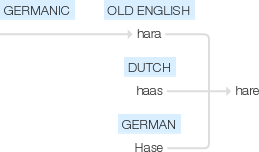Hare
Old English hara, of Germanic origin: related to Dutch haas and German Hase .
wiktionary
From Middle English hare, from Old English hara(“hare”), from Proto-West Germanic *hasō ~ *haʀ-, from Proto-Germanic *hasô, from *haswaz(“grey”), from Proto-Indo-European *ḱh₂s-én-
From Middle English harren, harien(“to drag by force, ill-treat”), of uncertain origin. Compare harry, harass.
From Middle English hore, from Old English hār(“hoar, hoary, grey, old”), from Proto-Germanic *hairaz(“grey”). Cognate with German hehr(“noble, sublime”).
etymonline
hare (n.)
Old English hara "hare," from Proto-West Germanic *hasan- (source also of Old Frisian hasa, Middle Dutch haese, Dutch haas, Old High German haso, German Hase), of uncertain origin; possibly the original sense was "gray" (compare Old English hasu, Old High German hasan "gray"), from PIE *khas- "gray" (source also of Latin canus "white, gray, gray-haired"). Perhaps cognate with Sanskrit sasah, Afghan soe, Welsh ceinach "hare." Rabbits burrow in the ground; hares do not.
þou hast a crokyd tunge heldyng wyth hownd and wyth hare. ["Jacob's Well," c. 1440]
hare (v.)
"to harry, harass," 1520s; meaning "to frighten" is 1650s; of uncertain origin; connections have been suggested to harry (v.) and to hare (n.). Related: Hared; haring.
